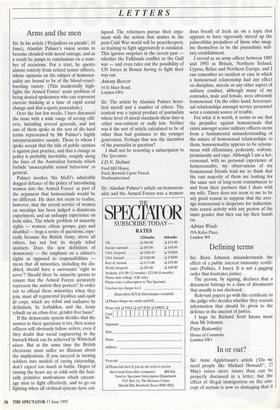LETTERS Arms and the men
Sir: In his article (Prejudices on parade', 10 June), Alasdair Palmer's vision seems to become clouded with moral outrage, and as a result he jumps to conclusions on a num- ber of occasions. For a start, he quotes almost entirely from retired senior officers, whose opinions on the subject of homosex- uality are bound to be of the blood-vessel- bursting variety. (This incidentally high- lights the Armed Forces' acute problem of being denied spokesmen who can represent current thinking at a time of rapid social change and dial-a-quote journalism.) Over the last few weeks, I have discussed the issue with a wide range of serving offi- cers, including several generals, and not one of them spoke in the sort of die-hard terms represented by Mr Palmer's highly unrepresentative sample. Those to whom I spoke accept that the tide of public opinion is against past practice, and that a change in policy is probably inevitable, roughly along the lines of the Australian formula which forbids 'unacceptable sexual behaviour' in general.
Palmer invokes 'the MoD's admirably dogged defence of the policy of introducing women into the Armed Forces' as part of the argument that homosexuals would be no different. He does not seem to realise, however, that the recent service of women on warships has been judged a disastrous experiment, and an unhappy experience on both sides. The whole problem of minority rights — women, ethnic groups, gays and disabled — begs a series of questions, espe- cially because the British Army, above all others, has not lost its deeply tribal instincts. Does the new definition of democracy — the emphasis on a citizen's rights as opposed to responsibilities mean that all minorities, including the dis- abled, should have a sacrosanct 'right to serve'? Should there be minority quotas to ensure that the Armed Forces accurately represent the nation they protect? In order not to offend these minorities when they join, must all regimental loyalties and esprit de corps, which are tribal and exclusive by definition, be forbidden, and the Army rebuilt on an ethos-free, gender-free basis?
If the democratic system decides that the answer to these questions is yes, then senior officers will obviously follow orders, even if they doubt that social engineering in the barrack-block can be achieved by Whitehall ukase. But at the same time the British electorate must suffer no illusions about the implications. If you succeed in turning soldiers into models of caring citizenship, don't expect too much in battle. Hopes of taming the beast are at odds with the basi- cally primitive motivations which encour- age men to fight effectively, and to go on fighting when all civilised systems have col- lapsed. The reformers pursue their argu- ment with the notion that armies in the post-Cold War world will be peacekeepers, so training to fight aggressively is outdated. This ignores surprises in the recent past whether the Falklands conflict or the Gulf war — and even rules out the possibility of UN forces in Bosnia having to fight their way out.
Antony Beevor
54 St Maur Road, London SW6


































































 Previous page
Previous page